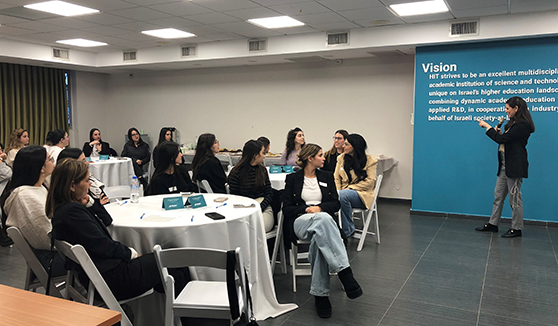More:
B.Sc. in Electrical and Electronics Engineering
B.Sc. in Electrical and Electronics Engineering
Dr. Amos Bardea, Head of Electrical and Electronics Engineering Department
A 4-year degree program with 6 tracks:
-
Power Systems & Renewable Energy Track
Head of track: Dr.Meir Arbel
-
This is a unique interdisciplinary program comprising relevant courses from disciplines such as power systems, chemistry, thermodynamics, power electronics, security and communication.
-
-
The courses cover solar, wind and water energies as well as smart grid, fuel cells and project-level entrepreneurship. The curriculum includes basic mathematics and physics as background to the more specific technical courses.
-
This track emphasizes the theoretical, technical and practical aspects of energy usage, preservation, and efficiency. It also deals with energy economics and policies, as well as minimizing the environmental impact of energy use. -
Communication Engineering Track
Head of track: Prof. Uri Mahlab
-
Prepares students for advanced degrees in the field, as well as meets the huge demands from industry for skilled engineers in the field of communication possessing a solid academic background and skill-sets based on the required courses as well as cutting-edge elective courses.
-
The track covers analog and digital communication basics, data/computer communication, and cellular communication. In addition, the Radio Frequency (RF) area covers the following topics: distributed systems, radar, antenna, optical communication, digital signal processing and multimedia. -
Bio-Engineering Track
Head of track: Dr. Ronen Sosnik
-
In recent years, there has been a significant and growing demand for engineers with a background in anatomy, physiology and medicine, who can collaborate with physicians in providing technological solutions to medical challenges.
-
-
The B.Sc. Bio-Engineering track, provides students with background knowledge in both medicine and physiology. The mandatory courses in this track include selected topics in biology and chemistry, anatomy, biomedical transducers and instruments, and a laboratory for biomedical instruments. In addition, there are a variety of optional courses.
-
The Electro-Optics and Image Processing Track
Head of track: Prof. Boris Apter
-
Maintaining a vibrant electro-optics program is one of the Faculty’s high priorities due to the importance of electro-optics to everyday life and the rapidly growing applications of this field.
-
-
The curriculum comprises basic and advanced courses and laboratories in both classics as well as state-of-the-art topics, introduction to electro-optics and modern optics, image processing, optics system design, electro-optic devices laboratory for electro-optics and image processing, and optic fibers.
-
Control and Robotics Track
Prof. Eli Gershon
-
The track aims to provide the students with an assortment of courses in basic and state-of-the-art control that will allow them to acquire the relevant required knowledge and skills.
-
-
The track has several mandatory courses including an introduction to advanced linear control, automatic control, and a control laboratory. The students can choose additional courses from a wide variety of optional courses such as introduction to robotics, electronic devices, and advanced automatic control.
-
Embedded Computer Systems Track
Head of track: Dr. Nonel Thirer
-
Embedded systems control the functionality of the vast majority of the advanced products currently being designed around the globe.
In an embedded system the core functionality is run by a computing device that controls an array of physical devices; embedded system implementations span a very wide range of hardware (HW) /software (SW) architectures.
-
-
At one end of the range, a complete embedded system can be implemented on a single chip, known as system-on-a-chip, or SoC. At the other end of the range, we can find embedded systems that are the functional backbone within a System of Systems, such as a future autonomous, driverless, road transportation system.
-
- News & Events



